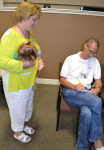Walking in others' shoes

A group of community members gathered on Wednesday to learn of issues people with limited resources face daily. The event was a Poverty Simulation hosted by USD 234 and Southeast Kansas Community Action Program (SEK-CAP) and held at the Fort Scott Church of the Nazarene.
The purpose was to bring awareness and education on the day-to-day life of those in poverty situations.
During the Poverty Simulation event, participants role played people struggling with poverty in the U.S. They are assigned tasks they must complete, such as working, paying bills and getting transportation to do all of the required tasks, with the limited resources they have.
Some of the volunteers were divided up into family groups. Other volunteers played representatives of organizations in the community -- a banker, a grocery store clerk, a police officer, a pawn shop owner and easy-cash shop owner, among others.
"I was interested in being part of a family trying to stretch the family income for child care, groceries and getting to college," said Barbara Albright, Bourbon County second district commissioner, who played a 20-year-old college student with a baby, and was still living at home with her father.
"I had a little brother with medical issues and a (single) father who was really trying to keep his family going," Albright said.
She got frustrated in that role when she kept hitting brick walls.
"I had to have child care paid up-front, so I had to miss my college classes (when she couldn't pay for the child care). Within four weeks I had to drop out," she said.
Her father in the simulation was Tim Woodring.
"Dad had a pretty good job, 40 hours a week and got paid each week," she said.
However, "You were always waiting in lines and waiting for the (helping) agencies to open. The one thing I learned was when you are down and out and people have all these rules, you find yourself getting frustrated with the way it works," Albright said.
Mary Wynn, a registered nurse at Mercy Hospital, played the guardian for her two grandchildren and had a disabled husband. The family had only one vehicle.
"Making sure the grandchildren were taken care of, going to the grocery store...trying to apply for the public services that are available the same hours I worked," Wynn said. "There wasn't enough of me to reach out for the resources. It was a good exercise. I found that though the agencies people were friendly, they really couldn't emphasize with my situation."
Janet Braun role played as a social service agent, one that many of the families had to report to. Her perspective was on how transportation plays a big role in life situations.
"I saw how hard it is for particularly, transportation." Braun said. "I would like to have a building where we would be able to have all the helping agencies in one spot, so transportation wouldn't be so much of an issue...SRS, mental health, childcare, the Beacon, Mother to Mother Ministry, enrolling your child in school."
Braun is involved in many service organizations in Fort Scott and is the president of the USD 234 Board of Education.
"Can organizations somehow help with these issues that people are facing?" Braun asked. "Like my church, like school. The simulation made things seem real and I'm understanding the issues better."
Angie Kemmerer, USD 234's early childhood coordinator, attended the Kansas Conference on Poverty in July, and brought the idea back to Superintendent Diane Gross, who thought it would be good for the Fort Scott community. Kemmerer said Reta Baker with Mercy Hospital and Lindsay Madison with the Fort Scott Area Chamber of Commerce helped with organizing the event.
